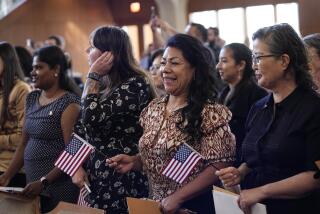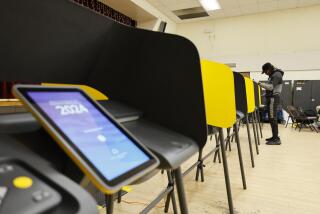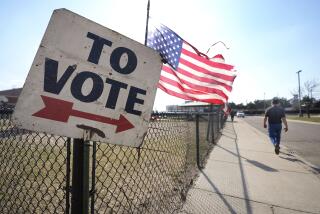Expat Americans are mostly pro-Clinton — just listen to these guys in Germany
At an anti-Donald Trump rally here, Leah Morris registered for an absentee ballot in her home state of Oregon and explained why many other Americans living abroad were doing the same.
“We can make a crucial difference this year,” said the 27-year-old freelance editor. “Even if we’re not directly engaged in what’s going on in the United States, this election really matters to us.”
She plans to vote for Democrat Hillary Clinton, who political analysts predict will be the candidate of choice among millions of expatriates.
The vast majority of U.S. citizens overseas have college degrees, placing them outside the less educated demographic that heavily favors Republican Trump. Experts say Trump’s unpopularity abroad could also influence those voters.
“It’s likely that these voters will be more likely to be put off by Mr. Trump’s positions on international affairs, immigration and trade,” said Jay Sexton, a political scientist at the University of Missouri who has studied how expatriates vote.
If the presidential election is close enough, those voters could be a critical factor, said Mark J. Rozell, a political scientist at George Mason University. “I don’t think many people really know that and certainly very few analysts are talking about it,” he said.
Estimates of the number of potential U.S. voters abroad vary widely, from 3 million to 8 million. Most live in Canada and Mexico, but there are more than 200,000 in Great Britain and more than 100,000 in Germany.
They include members of the military, exchange students, businesspeople, scholars, IT specialists, musicians, basketball players and English teachers. Surveys have found that about a quarter moved abroad because of romantic relationships with foreign citizens.
Expatriates were given the right to vote in federal elections — in their last state of residence — through the Overseas Citizens Voting Rights Act of 1975. Most do not exercise that right and so for a long time were never considered much of a factor in politics.

That changed after the extraordinarily close 2000 election of President George W. Bush, whose critical 537-vote advantage in Florida came in part from delayed overseas ballots, according to Sexton.
He said votes from abroad played a key role in the election of two Democrats to the U.S. Senate: Virginian Jim Webb, who won by 9,329 votes in 2006, and Minnesotan Al Franken, who won by 312 votes in 2008.
In the 2012 reelection of President Obama, 606,425 expats cast absentee ballots, according to a study Sexton conducted for the Rothermere American Institute at the University of Oxford.
No data was available on how they voted, but available indicators suggested they favored Obama. Of the $6 million in campaign contributions from abroad in that race, about $5 million went to his candidacy.
Traditionally, Republicans have benefited from the overseas military vote while Democrats did better among civilians, researchers said.
Democrats are expected to maintain an overseas advantage once again this election. In Berlin, it’s not difficult to find Americans who plan to vote for Clinton.
“I’d guess more expats will be voting for Clinton because living outside the United States makes you more open to what’s going on around the world as a whole,” said Robert Gutowski, a trombone player and music teacher in Berlin who was stationed in Germany and stayed there after leaving the Army in 1990. “You’re more sensitive to what’s going on.”
He votes in the swing state of Virginia and still relishes the power he felt in helping elect Webb in 2006. “It was the first time that I really felt like I had made a difference,” he said. “I felt like every single vote really did count. It was a great feeling, very empowering. I definitely don’t want to ever miss an election.”
Ray Amador, a graduate student in physics at Berlin’s Humboldt University, said he was so concerned about being eligible to vote back home in Pennsylvania that he flew there to make sure he was registered.
“I just want to make sure that Trump doesn’t win,” he said. “People are always asking me about Trump. He’s already made life more difficult for me even though he’s only a candidate.”
Trump supporters are harder to find.
“We feel a little outnumbered but we’ll fight on,” said Thomas W. Leiser, a 69-year-old businessman from Texas who has lived in Germany for eight years and heads the Republicans Overseas chapter there.
Leiser said he wishes politicians would take expatriate issues more seriously and in particular simplify the income-reporting requirements for U.S. taxpayers with foreign bank accounts.
“The core group supporting Trump isn’t living abroad,” he said. “But I do find a lot of people who say in private they will vote for Trump. But you’re not going to see them putting a Trump bumper sticker on their cars over here. Germans just don’t understand his type of personality.”
Kirschbaum is a special correspondent.
MORE ON CAMPAIGN 2016
New sex assault allegations against Trump: ‘He was like an octopus’
Trump falls behind in the USC/L.A. Times poll, one of his favorites
More to Read
Start your day right
Sign up for Essential California for news, features and recommendations from the L.A. Times and beyond in your inbox six days a week.
You may occasionally receive promotional content from the Los Angeles Times.






